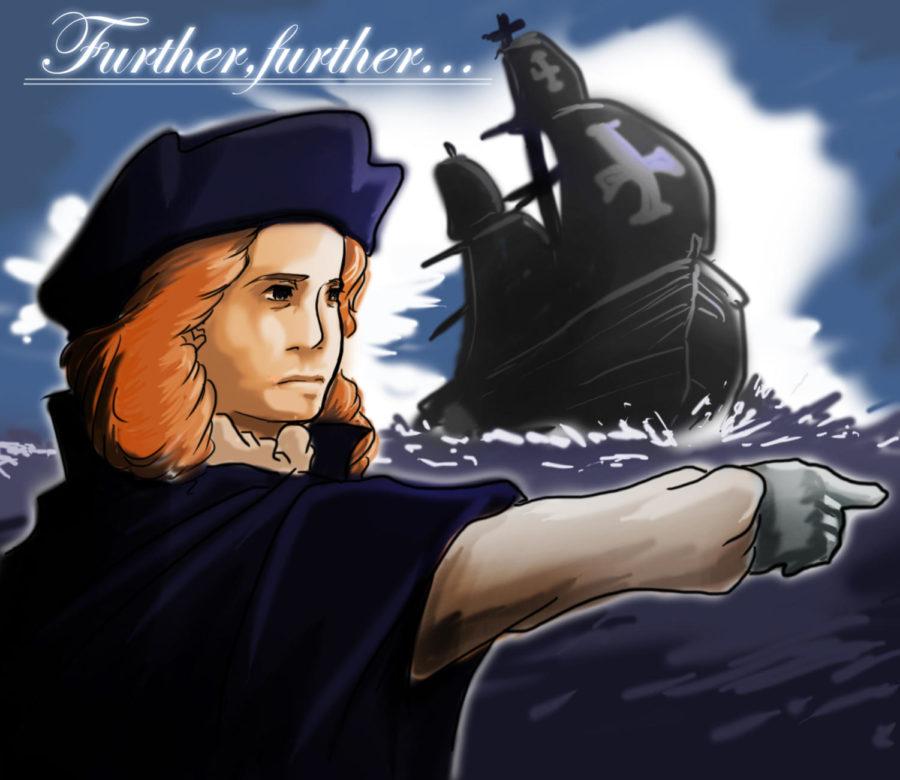Belding: Columbus Day still has constructive meaning for us now
Illustration: Bolun Li/Iowa State Daily
Opinion: Belding 10/9
October 9, 2012
Holidays such as Columbus Day rarely make headlines, as they are rarely considered exciting. Setting aside this day is, like setting aside other holidays, intended to mark a special event. “In 1492, Columbus sailed the ocean blue,” as goes the old rhyme school children become familiar with.
As we all know, this discovery of North America led to its colonization by Spain and other European powers such as France, England, the Netherlands and Sweden. North America became the site of a colonial race in which such countries sought outlets for surplus population; sources of precious metals, other natural resources and trade; glory; and imperial bargaining chips.
In the decades following the arrival of Europeans in the Americas, millions of the indigenous peoples died from war, from diseases they were not immune to but to which Europeans had been protected for centuries, and from the hardships of slavery. Despite the consequences of his discovery — not all of which are bad — Columbus Day is well worth marking, as it contains many lessons for us today.
One of my favorite sayings begins as a strong assertion but, before it can be finished, trails off into oblivion: “The best laid plans of mice and men.” Some things can be planned. Others can be staged and stage-managed. Still others, however, such as the exploration of new worlds (whether they actually be new places, or whether they be new areas of interest which we have not yet visited), cannot be anticipated.
Using inflated calculations of Earth’s circumference and Asia’s landmass, Columbus planned his 1492 and later voyages as explorations of Asia. Until his dying day in 1506, he insisted that he had reached the eastern extremities of what we know as Japan. Nevertheless, Columbus accepted his discovery, continuing his exploration over the course of three more voyages. He is, in that regard, a role model for us.
From our politicians’ reluctance to say they don’t know the answers to some questions and their readiness to spout off prefabricated talking points that are untailored to the vicissitudes of circumstance, to new students’ reluctance to walk up to a stranger and ask for directions rather than wander around aimlessly, we fail to understand the world and everything in it are in a constant state of flux.
We cannot and we should not seek to systematize everything. “The struggle is the glory,” as the saying goes, and it is because of the conquistadors’ struggles that they live in glory today.
Reflecting on Columbus Day can also help us realize that even the most important individuals among us — and maybe even ourselves — are fatally flawed. It is easy to mythologize the past and overlook the deep flaws of our predecessors such as the Spanish conquistadors, the Founding Fathers of the United States and other heroes. Carrie Chapman Catt, for instance, for whom the home of our College of Liberal Arts and Sciences is named, made statements (as did many people of her time) that we could consider today as racist. There is no escaping the original sin that forever condemns the human race to do bad and reprehensible things. Just as much as us today, the people to whom we owe great debts were fatally flawed.
That observation might sound foreboding, as if it was a death knell for the potential of human character.
I think, however, it is a challenge. Depending on what our wills lead us to do, we can be just as great or just as bad.
It is a challenge to do the best with what we have. One of James Madison’s insights into political theory as he defended the Constitution in 1788 was humans are imperfect beings; “If men were angels, no government would be necessary.” Perfection is eternally elusive, and to embark on the quest to attain it is to set off on a wild goose chase.
Our predecessors, those who captured the Renaissance in art, discovered the Americas, made great scientific discoveries during the Enlightenment, founded the United States, and bequeathed it all to us as a cultural inheritance have done great things. They took their world as it was, made up of the inheritance that the Hebrews, Greeks, Romans and medieval scholastics gave to them, and proceeded to make it their own. They made their own footprints rather than treading along in those already made.
They did not, however, let the success of their own predecessors overshadow their own potential to expand the balloon that is human greatness.
As we come away from Columbus Day and approach another important election and legislative deadlines, we should learn to accept things, deeds and solutions that are less than ideal.







